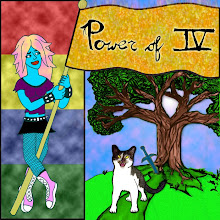Here's the first of two short essays I wrote for my "Critical Thinking" class in lieu of a final.
Yaser Esam Hamdi is a U.S. citizen. From 2001-2004 he was detained indefinitely for being an "illegal enemy combatant." He was detained without the benefit of presidential review, without an attorney, or hearing in front of a judge. Most appalling of all, he was detained by the U.S. government. Though this seems in direct violation of the fifth and fourteenth amendments to the Bill of Rights, garaunteeing due process to all alleged criminals, the government claimed it was constitutional. The crux of the Hamdi case lies in how one interprets the constitution.
Article II, Section 1 of the constitution states, "The executive power shall be vested in a President..." In this statement, the term "executive power" is ambiguous. It's meaning could forever be up for debate, but at its base, it gives the President the right to execute federal law. Article II, Section 2 states, "The President shall be commander in Chief of the Army and Navy of the U.S." It is the combination of the two that allowed the administration to pervert justice. After the terrorist attacks on September 11th, 2001, a frightened, Republican congress passed the Authorization for Use of Military Force Act. Executing this law as the Commander in Chief of the Army and Navy, the president claimed its action constitutional, i.e. - detaining any and all possible terrorists, for as long as necessary, as deemed so by the very same administration, regardless of evidence, and without representation. What this scenario does, essentially, is give the executive branch unlimited power to detain, and what's more, apparently allows a presidential trump of the Bill of Rights.
The problem for the President started when Hamdi attempted to file a writ of habeas corpus. He was picked up in Afghanistan 2001 by the Afghan Northern Alliance, who turned him over to the U.S. military during the U.S. invasion, claiming he was Taliban. Hamdi alleges he was there doing relief work. Without a trial or any representation, Hamdi was kept in Guantanamo Bay, then Norfolk, Virginia, then finally a brig in Charleston, South Carolina. Recognizing his rights as a U.S. citizen, Hamdi had his father file a writ of habeas corpus on his behalf. The District Court of the Eastern District of Virginia ruled that Hamdi be allowed a public defender, but the government appealed and the higher Fourth Circuit court reversed the order, citing the District Court's overlooking "intelligence and security interests." With this near martial law set-up, it seems any right could be dismissed if "intelligence and security interests" were not fully accounted for.
The District Court naturally disagreed, claiming that the government's evidence for detaining Hamdi was very weak, based on hearsay and possible lies, and demanded documentation which would allow for "meaningful judicial review." Only then could Hamdi's "unlawful combatant" classification be legitimate. The government appealed and the Fourth Circuit responded in a way that only thinly veiled their evil intent, claiming the only concrete fact, that Hamdi was indeed captured in a foreign combat zone, warranted his status. Hence, if they captured a goat, or any given Afghan citizen, or me, or you in a foreign combat zone, we too are enemy combatants and subject to a very broad government's whims. Even more audaciously, the court claimed that under Article II, Section 2 of the U.S. Constitution and, of all things, the principle of separation of powers between the branches of U.S. government, that no court could hear cases which may interfere with national security, as deemed so by the very same administration. This, as the executive branch attempts to wrestle power away from the judicial.
The corruption is obvious. The current administration has done so much to demonstrate the executive branch's power over the Bill of Rights. But, it is unjust. The Bill of Rights in a stop-time representation of what some very brilliant, enlightened men thought universal moral truths would look like on paper. It's direct application in our government guarantees U.S. citizens these rights, universally. What's more, giving the President certain rights does not imply other's can be taken away.
When the lower courts could not decide, the case was brought before the Supreme Court. In an understandable eight to one margin, the court ruled in favor of Hamdi, that the Executive Branch does not have the power to hold a U.S. citizen indefinitely without due process and a hearing in which he is represented in front of some kind of judicial review. Even though the court upheld these rights, they put a somewhat conservative limitation on what the rights entail. The burden of proof would not fall on the government to show, beyond reasonable doubt, that Hamdi is an "unlawful combatant," and the trial need not be in front of a U.S. court, but rather by a military tribunal. One can't help but worry that these two ingredients could lead to kangaroo courts, detaining possibly innocent men.
The usually conservative Justice Scalia had the right idea, limiting the power of the executive branch back down to where is proper. Scalia claimed that the government had only two options if they wished to detain Hamdi. One, Congress could suspend habeas corpus if and only if there was an invasion or rebellion on U.S. soil, or two, try him under normal U.S. law, which they wouldn't do without evidence. Scalia felt that it is the court's job to deem the action unconstitutional, not to invent new procedure that would render the actions constitutional.
That is what it all comes down to. In America, you are innocent until proven guilty. Whether or not Hamdi is an enemy of the state is and has been irrelevant. That is to be decided by the courts, not the president, the press, or the public. As a U.S. citizen, he is entitled to the same basic rights as all of us. Likewise, if any U.S. citizen's rights are deferred, than so could yours or mine. By finding in favor of Hamdi, the Supreme Court protected our rights from our President.
Claudia Boulton
7 years ago








































































































No comments:
Post a Comment